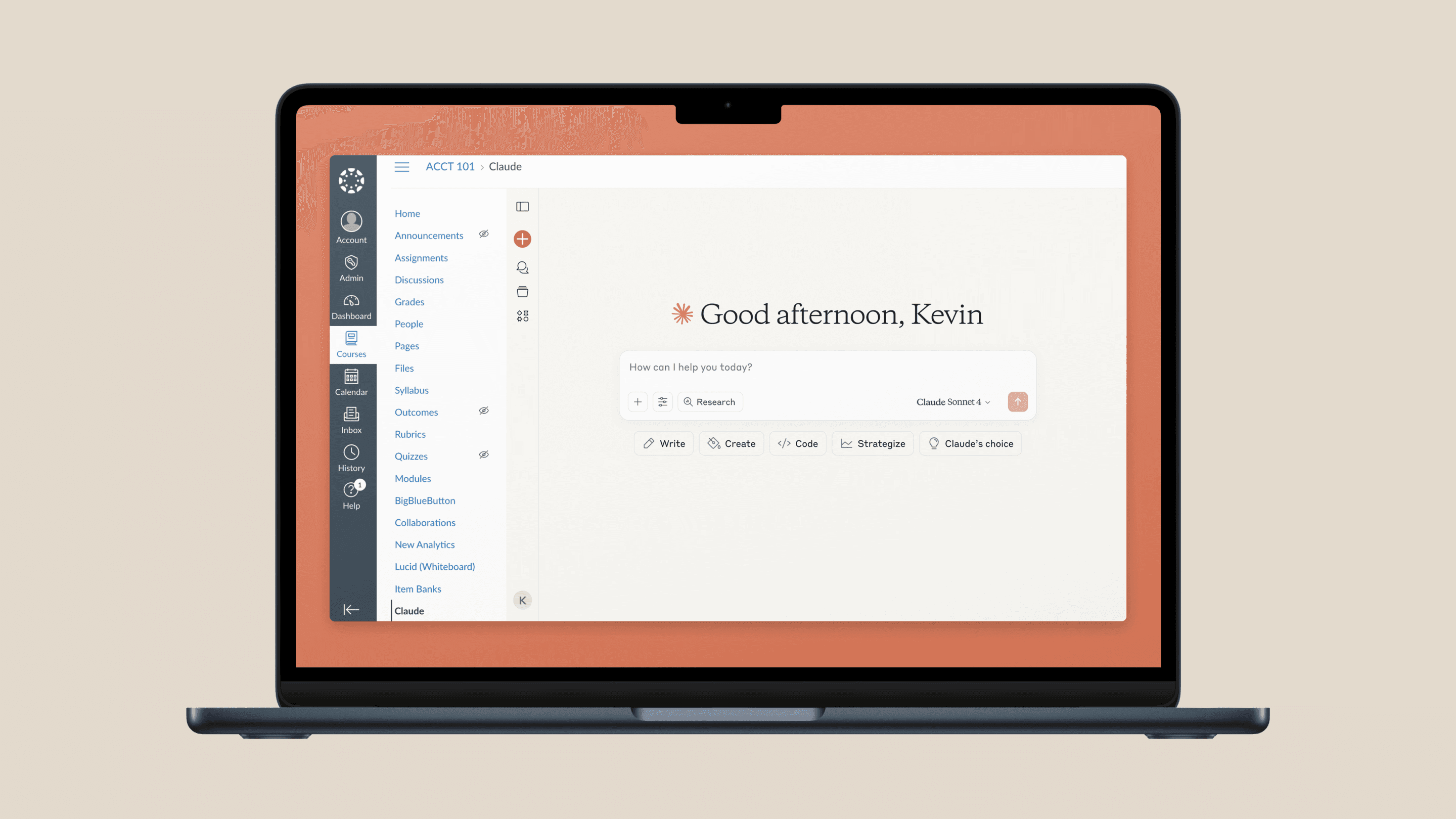Advancing Claude for Education

Today, we’re sharing a first look at upcoming integrations with Canvas, Panopto, and Wiley that bring Claude to Canvas and rich educational context to student conversations in Claude for Education.
Additionally, we’ve expanded our student ambassador and builder programs, launched our first free AI Fluency course, and welcomed several new institutions—including the University of San Francisco School of Law and Northumbria University—further advancing responsible AI adoption in higher education.
Bringing educational context to Claude
To make Claude a more powerful study companion, we’re building toward a future where students can reference readings, lecture recordings, visualizations, and textbook content directly within their conversations. Today, we’re sharing a first look at integrations with popular educational tools and resources rolling out over the next few weeks.
Students and educators will be able to connect Wiley and Panopto to Claude using pre-built MCP servers. With these integrations, users can reference lecture transcripts from Panopto and dive deep into their universities’ collections of authoritative, peer-reviewed content on Wiley—all within their Claude conversations.
“The future of research depends on keeping high-quality, peer-reviewed content central to AI-powered discovery," says Josh Jarrett, Senior Vice President of AI Growth at Wiley. "This partnership sets the standard for integrating trusted scientific content with AI platforms while creating a scalable solution for other institutions. By adopting the Model Context Protocol, we're ensuring authoritative research remains discoverable in an AI-driven landscape.”
Additionally, Claude now supports Canvas LTI (Learning Tools Interoperability), allowing students to use Claude directly within their Canvas courses without switching between platforms.

As always, student privacy protections remain our highest priority. Conversations are private by default and are excluded from AI training by default as well. In furtherance of academic freedom and intellectual exploration, we also require formal approval for institutional data requests and have limited self-serve data exports by default.
Partnering with universities
We partner with forward-thinking institutions that want to balance bringing AI to higher education with responsible practices as the technology evolves. The University of San Francisco School of Law, for example, is integrating AI-enabled learning into its curriculum to improve student engagement and outcomes.
Dean Johanna Kalb adds, “We’re excited to introduce students to the practical use of LLMs in litigation. One way we’re doing this is through our Evidence course, where this fall, students will gain direct experience applying LLMs to analyze claims and defenses, map evidence to elements of each cause of action, identify evidentiary gaps to inform discovery, and develop strategies for admission and exclusion of evidence at trial.”
Northumbria University recognizes that today's digital-native students expect modern, technology-enhanced education. “The availability of secure and ethical AI tools is a significant consideration for our applicants, and our investment in Claude for Education will position Northumbria as a forward-thinking leader in ethical AI innovation,” shares Graham Wynn, Vice-Chancellor for Education at Northumbria University. “Empowering students and staff, providing cutting-edge learning opportunities, driving social mobility, and powering an inclusive economy are at the heart of everything we do. We know how important it is to eliminate digital poverty and provide equitable access to the most powerful AI tools, so our students and graduates are AI literate with the skills they need for the workplaces of the future.”
Student programming
Building on the enthusiasm and momentum from our first cohort of student ambassadors, we’ll be expanding the student ambassador program tenfold over the coming weeks—welcoming many more passionate students to contribute to our community. Applications for the fall cohort are now open.
We're also launching Claude Builder Clubs on campuses worldwide, creating communities where students explore AI's potential through hackathons, workshops, and demo nights. Together, they’ll build AI-powered projects—anything from an app to help their colleagues study and learn, to the next billion-dollar startup. The clubs welcome all students, regardless of major or technical background, because Claude makes it possible for anyone to build software. Ambitious student leaders can apply now to launch a Builder Club on their campus this fall.
Looking forward
Institutions leveraging AI hold immense promise to transform education and bridge long-standing equity gaps in learning. Yet realizing this potential demands more than technological innovation—it requires thoughtful collaboration, unwavering attention to ethics and privacy, and a commitment to ensuring equitable access for all learners.
The stakes couldn't be higher: while the opportunity to accelerate educational progress is unprecedented, missteps could deepen existing divides and cause lasting harm. That's why we're committed to navigating this transformation responsibly, working hand-in-hand with our partners to build an educational future that truly serves everyone. To learn more about Claude for Education, contact our Education team.
Related content
Statement on the comments from Secretary of War Pete Hegseth
Anthropic's response to the Secretary of War and advice to customers.
Read moreStatement from Dario Amodei on our discussions with the Department of War
A statement from our CEO on national security uses of AI.
Read more